Oh, Game of Thrones. Love it or hate it, watching this blockbuster, award-winning, cultural behemoth is always a roller-coaster of emotions. We scream, we marvel, we tilt our heads slightly to the side in puzzlement and say, “Huh… well, I certainly didn’t see that coming. Neat?” Game of Thrones is an incredible spectacle. Its enormous budget allows for visual effects rarely seen on the small screen and its style of writing prioritizes unexpected plot twists over everything. Yes, everything.
There is nothing show-runners cum writers David Benioff and Dan Weiss won’t sacrifice to preserve the audience’s shock. And there is nothing they won’t do to get characters where they need to be so they can swing some swords. Gasps and actions are what got the show its following, and they can hardly stop now. No doubt they feel obligated to give the people what they want. If the audience isn’t gasping all the time, they may lose interest. They may start watching Showtime instead. What’s coherent plotting or character motivation compared to a 10.0 IMDB rating?
Traditionally, the greatest shock and/or spectacle of each season of the show has usually been reserved for the last-but-one episode, or close to it. That’s when that big centerpiece that the whole season has been building to happens, that thing that will keep people talking until the next season comes out. But sometimes, the climax is more satisfying than others. Sure, watching all those cool squirty blood effects is nice, but after seven years, you really have to push that envelope to make it worthwhile to go to a watch party on a Sunday night.
But which seasons’ peaks still have me searching for YouTube reaction videos? And which did I kind of tune out during and start playing Farm Heroes on my phone?
Well, here it is, the totally objective and definitive ranking of all the climaxes from the first seven seasons, evaluated based on dramatic satisfaction and mind-blowing-ocity.
-
Battle at the Magic Pond (S7)
Let’s be brutally honest here; those zombies are starting to look a little silly. There’s just something about that rattling-bones sound they make, and their comically oversized boots, that stopped being terrifying and became funny. The menace isn’t helped by how easy they are to kill. You can just hit them with a sword and they fall apart like they were made out of K’Nex. And the White Walkers aren’t fairing much better. They used to be terrifying, but now I giggle whenever I see the Night’s King (How do they know he’s called that, again? Did Jon make it up?) throwing lawn darts or whatever.
Also, nothing about this battle makes sense. I’m not even talking about the my continued confusion as to why anyone thought capturing a wight was a good idea or was necessary in any way, I’m talking about how physics and time both stop working for its duration.
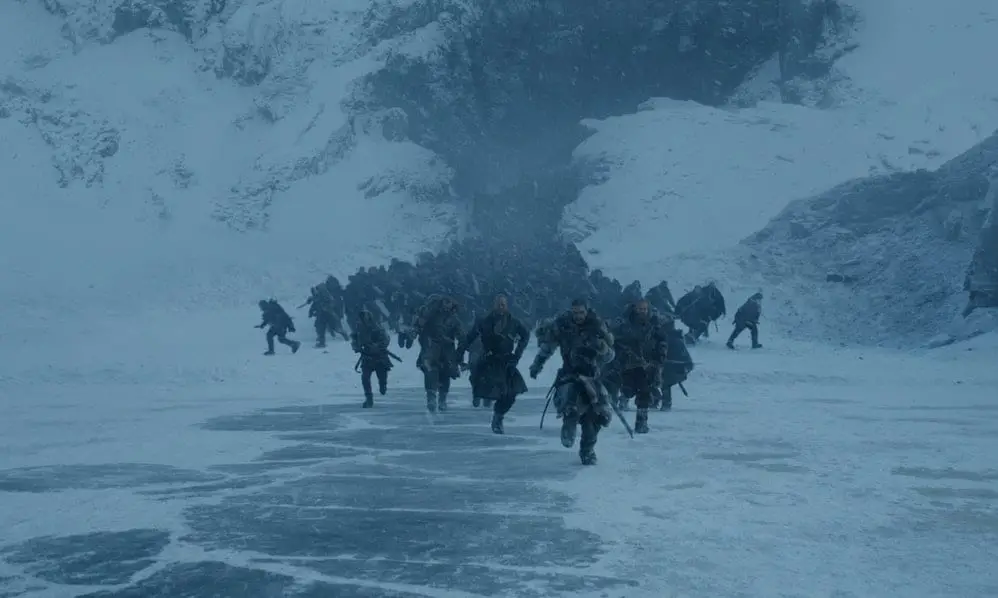
So… Gendry runs away as they’re being attacked by the Army of the Dead to run back to the Wall for help. Meanwhile, Team Jon has made it to an island in the middle of a small frozen pond whose ice has broken behind them. And since wights can’t swim (I’m sure nothing will happen later in the episode to contradict that…) they’re safe for one very cold night. But the next morning, dumb Sandor Clegane throws a rock and it lands in front of the zombie. The zombie thinks (?), “Hey neat, the ice has refrozen, presumably exactly this second,” and they all cross the ice to attack. Like… Are zombies smart enough to know that they can’t walk on water but not smart enough to know that water refreezes until a rock reminds them? But also not smart enough to realize that just because the ice can take the weight of a rock it doesn’t necessarily mean it can take the weight of several thousand zombies… Ugh, I’m getting lost in a rabbit hole.
Anyway, during this period of time we know to be one night, Gendry has made it back to the Wall, the dudes there have sent a raven to Daenerys way off most of the way down the continent, and she’s had time to change her outfit, have a heart-to-heart with Tyrion, ride her dragon all the way up to The Wall, AND find this one pond in the vastness of the Northern wilderness. In one night. Usually, these kind of practicalities are easy to overlook if the story is engaging enough (see: The Empire Strikes Back), but this was so over the line that it’s impossible not to be distracted by it, even if you’re barely paying attention.
Also, it’s a half dozen dudes in the middle of a pond. Even if you add Ancient Evil Ice Demons and dragons, the scope feels small. Especially considering we’re told the fate of the world hangs in the balance here.
-
Battle of the Bastards (S6)
The best thing about “The Battle of the Bastards” is that it’s apparently the name of season 6’s Big Huge Battle within the universe itself. Like, that’s what Hot Pie and all the other peasants call it. ‘Cause, you know, Jon and Ramsay were both bastards (or were they!) and they had a battle. So that must be significant.
I’m not especially convinced, I’m afraid. Jon and Ramsay aren’t particularly meaningful foils for each other and their rivalry is not much more than superficial. All the political agency on the Stark side, not to mention the political legitimacy, comes from Sansa. The one who actually does have a relationship with Ramsay and a reason to be in opposition to him. Jon just wanted to go on a road trip until she popped up and put everything in motion. They really should have called it “The Battle of the Messy Divorce.”
But that’s not at all how it was framed. This is Jon’s big moment! This is how he earns the respect of everyone and gets to be King in the North! He avenged The Red Wedding! Except, how? Did no one notice how he spent the entire battle making stupid decisions for no reason and then got nearly his whole army killed? The only reason he’s not pushing up daisies is because Sansa magically appears to bail him out with an army that he himself did nothing to earn.
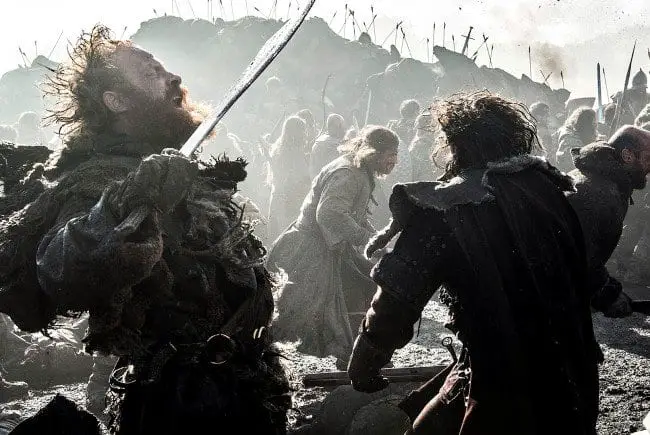
Then just to pour salt on the wound, everyone acts like Jon did anything at all but recklessly charge an army all by himself. And they make him king while the person who’s actually responsible for all the good things that have happened is sitting next to him.
UGH!
Honestly, the only reason this climax is second to last and not just last is because the battle itself was way more interesting than The Magic Pond. Even if the tactics made no sense, you could tell the people filming the combat knew what they were doing, and there were a few moments that were actually quite atmospheric and nice. But, like The Magic Pond, the lapses in logic are far too distracting to be able to enjoy anything. The event just can’t justify itself.
-
Hardhome (s5)
As I mentioned above, at some point, the wights and the White Walkers and all the supernatural denizens of the far North used to be scary, but at some point, they became funny.
This is that point.
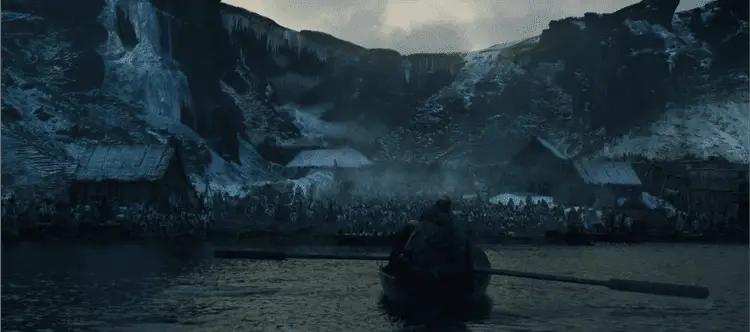
Okay, maybe it’s more correct to say that the wights became hilarious earlier—specifically at the end of season 4 when they attacked Team Bran and were exploded by fire balls thrown by what looked like a dirty fairy—but this was the first time we really see them being ridiculous en masse.
I suppose you can argue that the point of the Army of the Dead is that it’s so huge, they just keep coming in a never ending wave of senseless destruction. And that’s fine, as a concept, but Game of Thrones runs into the same problem many long running properties involving zombie-like bad guys run into. (*cough* The Walking Dead, *cough* the Borg on Voyager.) You see, the heroes need to survive, and maybe even win at the end, but you need to keep upping the peril or else the audience will get bored. So what ends up happening is that the enemy, while getting more numerous, is also getting weaker. In season one, Jon could barely fight off two lumbering corpses as they slowly tried to coke him, and had to seriously injure himself to do it. By season 5, he’s tearing through a hundred speedy, hissing skeletons by himself and they just fall apart when you hit them hard enough.
The White Walkers themselves haven’t quite hit this point yet, (Jon killed one and it was a huge deal) but they have become, by “Hardhome,” far too visible. Remember how terrifying it was when one of these guys attacked Sam and Gilly? Now you see five of them all together so often that you’re just like, “Oh, those guys.” This is the episode where this really becomes an issue. They became just another opposing military force. A powerful one, sure, with magic and a bottomless pit of manpower, but they’ve certainly ceased to be a force of nature or an existential threat to the essence of humanity.
Honestly, I had trouble with the ordering this battle and number 6, “The Battle of the Bastards.” They had a lot of the same kinds of things going for them, in particular a couple of moments where the sound and visuals were really working for me. My favourite was when that one White Walker walked into a burning building and the music changes while the flames kind of cringed back from him. It was nice.
Also, the very existence of this battle justified itself a little more than season 6’s, from the point of view of character motivation. Wanting to get those wildling refugees the hell away from Hardhome makes perfect sense politically and militarily. And it makes a lot of sense that Jon would want to do that based on the fact that the previous three seasons were all about him bonding with the wildlings and learning about how they’re not the true enemy. (More or less. Let’s just give the show that one.) So despite quite a few problems with the execution of this arc, it still makes more sense than the season 6 decision to create a rivalry with Ramsay Bolton out of nowhere.
4. Battle at the Wall (s4)
Season 4 was when the pattern that this list is based on—that of the greatest spectacle of the season dominating the penultimate episode—was really set in stone, and clearly began to dominate the season as well.
Because boy was it ever important for this battle to happen exactly in the ninth episode. In order to make this happen, they filled up the beginning half of season 4 with nonsense like Karl Tanner and his stupid rape shack. They also shoved other things, like Jon’s election as Lord Commander, which thematically belonged at the end of Jon’s arc this season, to the beginning of the next, where it was inevitably rushed through so they could get to the content of that season’s plot. (Such as it was.) It’s really due to the painfulness of this contrivance that I can’t like this battle, but in isolation, it really wasn’t that bad.
Firstly, there was build up to this, arguably three seasons’ worth of build up, and there were actual emotional stakes for characters who we cared about and were not yet total shells of themselves at that point. I kind of hated Ygritte, but her death was impactful. And the moral ambiguity of the situation was at least a little compelling even if it was undermined by the cannibals who killed Olly’s mom. We knew the wildlings had a point, at least, and so did Jon. So, like, actual conflict. And poor Grenn. 🙁
Minus 500 points for the Olly kills Ygritte thing. We all saw it coming and it was dumb.
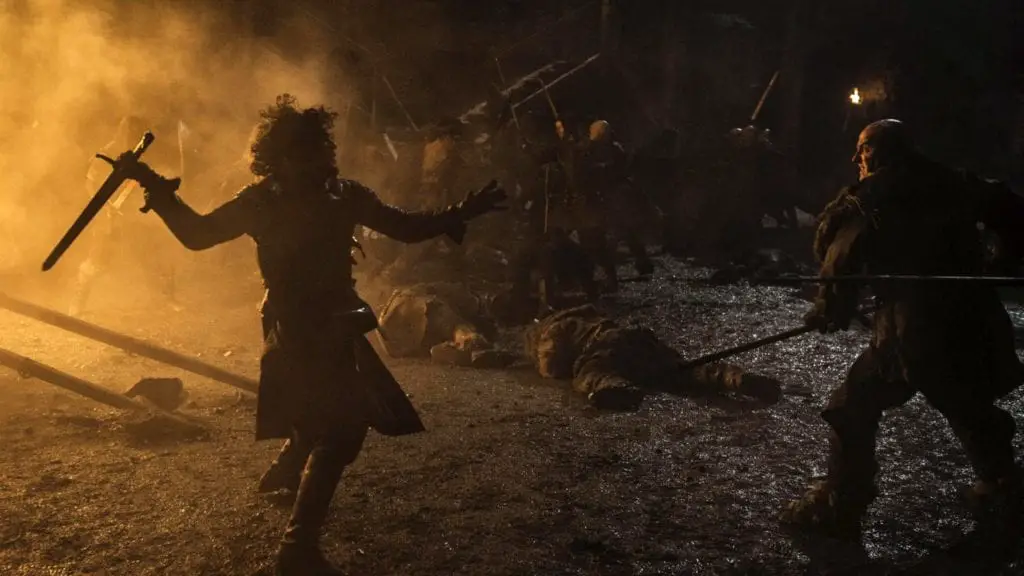
In terms of production value and technical competence, yeah, it was good. The mammoths were cool. I liked Alliser Thorne for five minutes.
We’re so far beyond it now that it’s almost funny to think about, but at the time, the way this Big Huge Battle really messed up the pacing of the season was highlighted by considering it as an adaptation of A Storm of Swords. In that novel, the “battle” was more of a siege. It lasted weeks and was a constant, slow onslaught, chipping away at defenders and their physical and mental resources. The closest thing to a battle was when the group that Jon crossed The Wall with attacked from the south, and that was over before the giant host started attacking The Wall.
There’s no reason why the show had to pace the season the way it did. Considering the filler, it’s not like they ran out of time. The only reason was that they felt obligated to have something big happen in the ninth episode.
I’m not overly impressed with the result.
-
Behead Ned (S1)
Poor Ned Stark.
He was clearly too good for the grimdark world that Game of Thrones was creating and so he haplessly blundering into his own destruction. If only he had been less honorable and more Machiavellian, maybe this whole War of the Five Kings thing wouldn’t have happened. But his death did teach us this show’s first great lesson: honor gets you killed, and there’s no point trying to be a decent person.
Fine, I shouldn’t rant. And after six years I really should be over the very questionable adaptational choices that made the series’s first protagonist seem more dumb than principled, even if it rather doomed the show as an adaptation from the start. The first season was still quite watchable. I would even say I liked it very much. But gods is it ever obvious in retrospect that firstly, the writers of the show had zero respect for Eddard Stark’s character, and secondly, they didn’t understand his story in the first book at all.
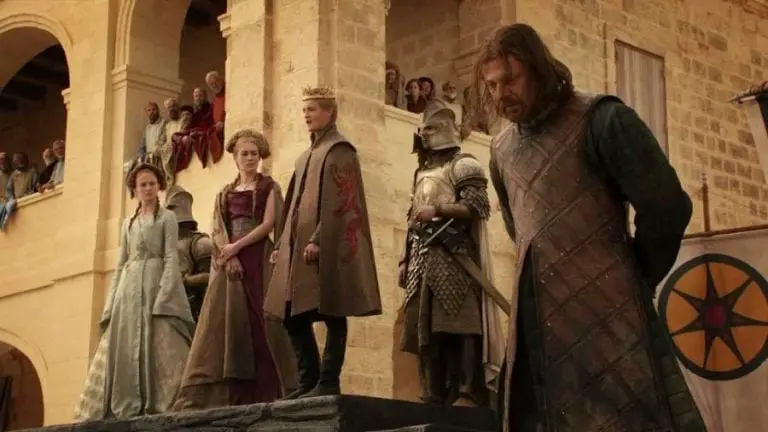
But that’s not necessarily relevant to us here. Ned’s death in the show’s first penultimate episode was a genuine shock, not just because most of the audience didn’t expect it, but because it actually grew out of the characters, rather than just popping out of nowhere like a jump scare in a bad horror movie. I’m also much more of a fan of the way it was filmed than some later Big Shocks™. Less blood splatter and more characters reacting.
So why isn’t this on top? Well, there might be a little to this whole phenomenon of growing stakes. Looking back, this event is rather small scale. It is just one guy dying, even if he’s a main character. By season 4, more gruesome and shocking deaths are happening every other episode. If this climax was in a later season, it might not count as the high-point of an episode, let alone a season.
-
Red Wedding (S3)
Benioff and Weiss have made little secret of the fact that it was The Red Wedding, the climax of the third season that resets the geopolitical situation of Westeros, as well as our roster of main characters, that first attracted them to adapting the book series. And to be brutally honest, it kind of shows. There are fewer shits given about everything after this, as if they’re just trying to get to the end so they can go take a nap. The rather homogenous Big Battles that dominate the later seasons, and the bottom of this list, are a pretty clear indication of that.
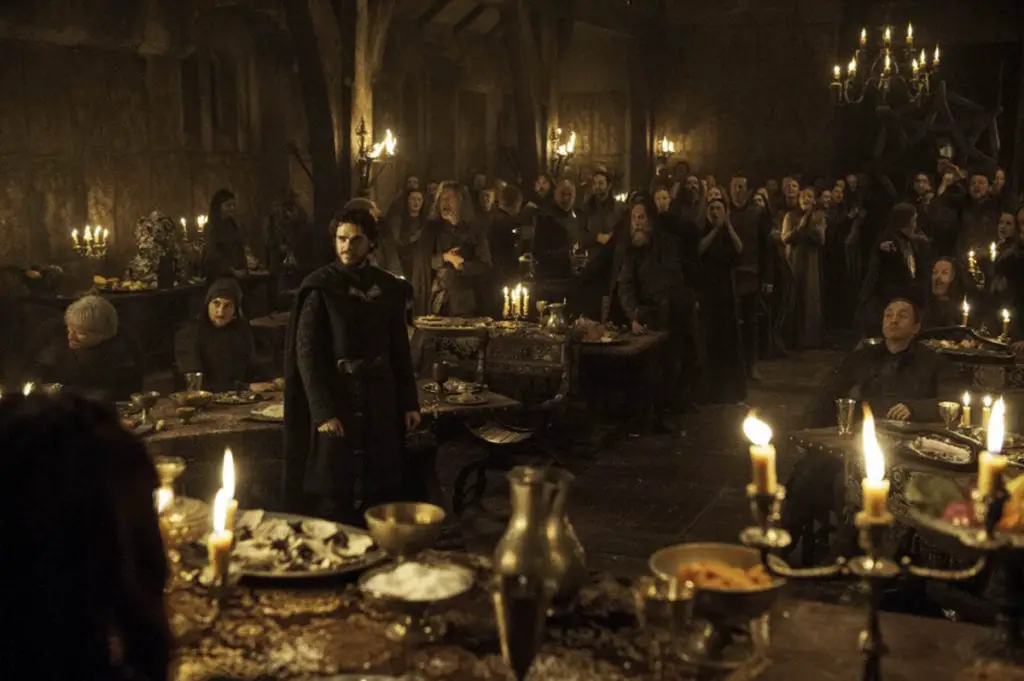
Say what you will about the gory aspects of the violence in this sequence (and trust me, I have a lot to say about it,) you can see on the screen how much the people behind it were reveling in it. Boy did they think they were making the best thing ever committed to film. It was so edgy of them to stab a pregnant woman in the uterus like that.
It was shocking. But that was also kind of the problem. Especially because the shocking aspect of The Red Wedding was seen as the key to its success, and one that the show has been trying to replicate with every shock since.
Looking at this as an adaptation of the book series, again, is what really highlights this. There, the mass murder is very heavily foreshadowed, to the extent that you feel a little foolish for not seeing it coming. But there was very little of that preserved here. There’s not really any way to tell what might be coming until three seconds before it happens. And that kind of misses the point of the whole thing. Perhaps in retrospect you can see how the Red Wedding, or something like it, was inevitable, but that sense of doom is just not there.
But why is this so high on the list at all? Well, as far as jump shocks on this show go, this is probably the best of its type, and the season did naturally built to it in a way that is often missing in, say, any season after this.
-
Battle of the Blackwater (S2)
I don’t think I have anything but good things to say about “Blackwater.” It’s easily the high point, not just of season 2, but of the whole series. Easily.
A cynic might say that the only reason I would say that is because this episode was written by George R.R. Martin, the author of the book series, so of course I would think it was better. Maybe his actual insight into these characters, Sansa in particular, had something to do with why I like this. However, his episodes in the next two seasons prove very definitively that not everything Martin touches on this show turns to gold. (Seriously, what even was “The Lion and the Rose”?)
“Blackwater” is good because it does, and does well, all the things that people seem to think Game of Thrones always does. The action is technically brilliant, the acting is as good as acting can get. There’s an unavoidable feeling of grey and grey morality. There are enough characters on both sides we feel sympathy for that it’s not a matter of wanting the “good guys” to win, because who are they exactly? Sure Joff and Cersei are both pieces of work, but then what will happen to Sansa and Tyrion, who’s in the middle of his Crowning Moment of Awesome. Stannis is apparently a wet blanket who likes to burn people, and he has a bit of an entitlement issue, so we’re not sure how much better he would be than the Lannisters, but we like Davos at least.
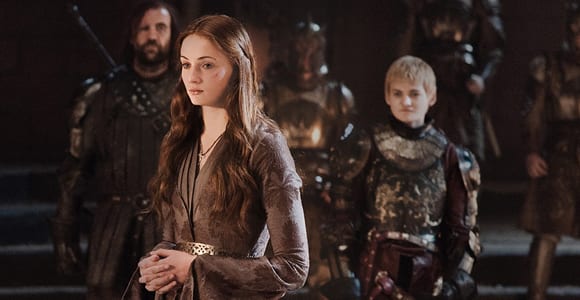
The strength of the episode is in the characters. It’s a character driven battle episode. There may have been lots of explosions and sword swinging, but the important parts were the characters’ actions within the battle and their conversations with each other. But it wasn’t all sitting and talking. They struck a balance between action and character that one might characterize as “good” and “well done.”
I feel like if the rest of this series was even half as good as this episode, I wouldn’t spend half my life complaining about it.
Unfortunately for me, the success of this battle has probably been what they’ve been trying to lazily replicate ever since the Red Wedding. It doesn’t make this episode less good, but it does rather imply that they haven’t figured out what made it that way.
***
Next year, Games of Thrones will return, no doubt with the season topping climax that will top everything and wrap up the series in a dramatically satisfying and thematically cohesive manner. The Fandomentals, god help us, will be here on the journey with you all then. But it the meantime, check out our ongoing season 7 retrospective series and the Unabashed Book Snobbery podcast.

